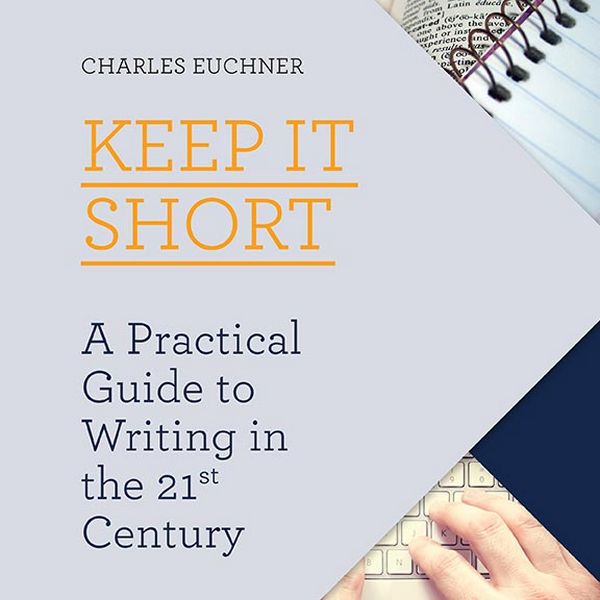
About the Book
This book really makes you want to write! Whether you are starting your first novel or blogging up a storm, this book will make you a better communicator in the 21st century, the Age of Brevity and the Internet.
If you can keep your writing brief and concise, you can save countless hours of frustration — for yourself and your readers. It’s hard at first. But by mastering a few simple “tricks of the trade,” you will not only keep it short. You will also discover new ideas, find new angles, and write with more zip. This short guide shows the way.
If you need to steal or borrow it, go ahead. Otherwise buy a copy. While you’re at it, buy some for your coworkers and friends too.
“I wrote short for 30 years because I was a journalist and critic for a newspaper, notoriously stingy with column inches. Keep It Short would have been really helpful. Instead, I learned it all on the job. Take if from me, reading this before you start is easier.”
— Bernard Holland, former chief classical music critic, the New York Times, and author of Something I Heard
“If all writing, in one way or another, seeks to solve riddles, as Charles Euchner poses, Keep it Short is a guidebook for a riddle-master. No matter what you write, Keep it Short will help you write a tighter, more focused, more inspired text.”
— Kris Spisak, Author of Get a Grip on Your Grammar: 250 Writing & Editing Reminders for the Curious or Confused
 About the Author
About the Author
Charles Euchner, the author or editor of nine books, is the principal of The Elements of Writing and now the author of “Keep It Short: A Concise Guide to Writing in the 21st Century.”
The Elements of Writing offers books (all available on Amazon), seminars and workshops, and coaching for authors. Euchner has coached a wide range of authors, including former diplomats, a best-selling sports author, and a historian.
Euchner’s previous nonfiction narrative work is the acclaimed “Nobody Turn Me Around” (Beacon Press, 2010), an intimate account of the 1963 March on Washington. Based on more than 100 interviews and thousands of pages of archival materials, this work offers the only complete study of the only moment when all of the factions of the civil right’s movement gathered in one place, a day capped by Martin Luther King’s “I Have a Dream” oration.
Also by Euchner, exploring baseball from its highest to lowest levels. “The Last Nine Innings” provides a dramatic narrative of the seventh game of the 2001 World Series between the Arizona Diamondbacks and the New York Yankees. “Little League, Big Dreams” looks at the revolution in youth sports through a portrait of the 2005 Little League World Series.
Until June 2004, when he stepped down to satisfy the demands of his writing career, Euchner was the executive director of the Rappaport Institute for Greater Boston at Harvard University’s John F. Kennedy School of Government. In that capacity, Euchner coordinated a wide-ranging research agenda on urban and regional politics and policy, conferences and other events, training programs for public and public service fellowships for graduate and professional students.
Euchner edited the Governing Greater Boston Series, served on numerous advisory committees, and contributed to newspapers and magazines on issues facing the region.
Euchner has written widely on public affairs. His most recent book on politics and policy, coauthored with Stephen McGovern of Haverford College, is “Urban Policy Reconsidered: Dialogues the Problems and Prospects of American Cities” (2003). That book has won praise for its comprehensive and even-handed approach to complex issues. The book has been praised not only by scholars of urban affairs but also by practitioners as diverse as Michael Dukakis, the three term Massachusetts governor and 1988 presidential nominee, and Steve Goldsmith, the former Indianapolis mayor and domestic policy advisor to George W. Bush.
Euchner’s research has focused on the grassroots level of politics. His book “Extraordinary Politics: How Protest and Dissent Are Changing American Democracy” (1996) provides a critical analysis of the causes, strategies, tactics, and effects of outsider forms of politics in the U.S. “Playing the Field: Why Sports Teams Move and Cities Fight to Keep Them” (1993) was the first book to question the economic and political arguments for building sports stadiums.
Prior to entering academe, Euchner was a staff writer for Education Week, the nation’s newspaper of record for elementary and secondary education. At Education Week, Euchner covered the federal government, teachers unions, state education policy, and computers in education.
Euchner received his B.A. from Vanderbilt University and an M.A. and Ph.D. from the Johns Hopkins University. www.theelementsofwriting.com

Leave A Comment